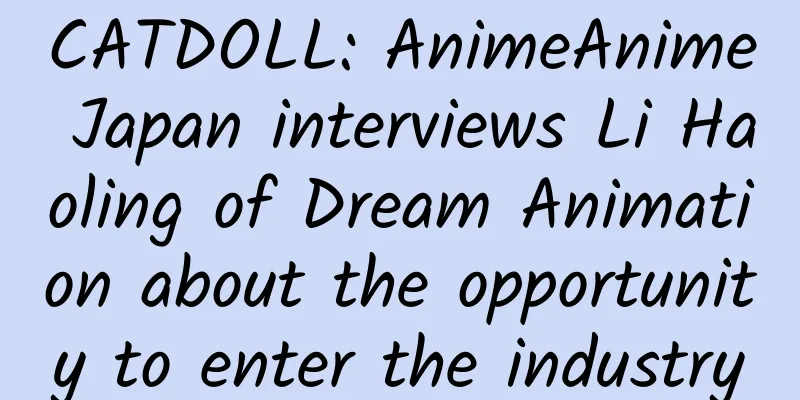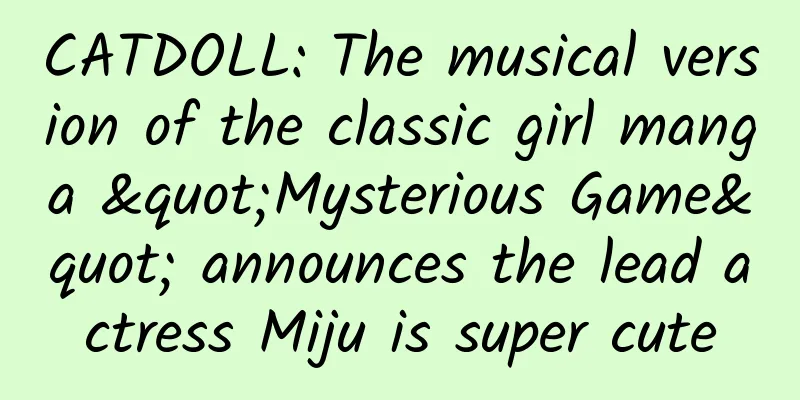CATDOLL: AnimeAnime Japan interviews Li Haoling of Dream Animation about the opportunity to enter the industry

|
Recently, Anime Anime, a well-known Japanese animation website, conducted an exclusive interview with the Japanese branch of IMAG Animation, and IMAG Animation CEO Li Haoling was interviewed by the website. In the interview, Li Haoling revealed the reason why he decided to enter the animation industry - he was greatly shocked by the animation "The Last Weapon Girl" when he was in college, so he decided to enter the animation industry because he felt that making animations was a very meaningful and valuable thing. In addition to the opportunity to enter the animation industry, Li Haoling also focused on the differences between the Chinese and Japanese animation industries, as well as the problems encountered when cooperating with Japan. Li Haoling said that in addition to differences in culture, language, and habits, there are also great differences between China and Japan in business cooperation. For example: In China, we regard contracts as a means of protecting ourselves, while Japan sometimes conducts verbal cooperation or drafts business contracts with unclear content. Even with many challenges and difficulties, Huimeng Animation has overcome all difficulties and established good cooperative relations with Japanese animation production companies, such as Studio Deen, which produced "Once Upon a Time There Was a Spirit Sword Mountain", Blade, which produced "One Lesson One Practice", and Shinichi Watanabe, the animation director of "The Evolution of Perfect Miss". In addition, Li Haoling has also expressed his commitment to introducing Japan's excellent and complete animation production process to China, striving to make Huimeng a bridge between the Chinese and Japanese animation industries and promote the development of China's animation industry. 【Translation of interview with director Li Haoling】 After entering the online animation publishing market, Huimeng has grown rapidly ——Can you please tell us what kind of studio Huimeng was originally? Li Haoling (hereinafter referred to as Li): In a nutshell, it is an animation production company. Up to 2013, we focused on Chinese TV animation production. At the end of 2013, online animation production exploded, so Huimeng also caught up with this trend with short anime. The so-called short anime is an animation that can be easily watched on a tablet. Now that the Internet environment is complete, we can produce longer animations. China is a country with stricter broadcasting regulations than Japan. There is a certain degree of mismatch between the TV station's policy and the audience's needs. Then, with the development of the Internet, more and more viewers like to watch programs on mobile terminals such as tablets and mobile phones. ――It is quite suitable for online publishing environment. Li: That's right. Besides the fact that the Internet is run by investors, it is very free, so you can simply invest in works that the audience wants to see. In fact, after the rise of online animation in China, a new animation culture also began. Huimeng joined the battle at this time and entered the market one step ahead, so it was also valued by many investors. As for Huimeng, what we are thinking about now is how to make good works and how to let everyone know us. Although China is dominated by hand-drawn 2D animation, because there was a period of time when it was completely developing towards 3D, China's 2D animation technology is one step behind others. Therefore, in order to learn the technology of Japan and South Korea, Huimeng entered South Korea in 2015 and then came to Japan. We think that one day in the future, we will make the relationship between China and Japan closer and introduce Japan's good stories and animation production personnel to China. The path that Huimeng has taken so far is probably like what is mentioned above. ――What made you interested in animation? Li: When I was in junior high school, I watched animations such as "Slam Dunk" and fell in love with animation. The biggest opportunity was when I was a college student. At that time, I was shocked after watching the TV animation "The Last Weapon Girl". Although it was a very sad story, the impact was too strong for me. I felt very depressed for a month after watching it (laughs). At that time, I really experienced the power of animation works to give people a strong impact and change their mood and worldview. From then on, I felt that making animations was a very meaningful and valuable job. ――It really is a fresh start. Li: Yes. Because of this, I originally studied architecture in college, but ended up joining the animation industry. I first went to a TV station in Shanghai, and finally became a director who produced animations suitable for TV broadcasts. Although China has different TV stations in different regions, the works I produced were broadcast in Shanghai. After that, I moved to Huimeng. Barriers perceived in the Japanese animation industry ――The opportunity to enter the animation industry is universal. Let's change the subject. Can you tell us about Tokyo Emu? For example, what kind of results have Emu achieved in broadcasting TV versions of animation in Japan this year? Lee: In this year, I experienced quite a lot of good and bad aspects of Japan. This is because foreign companies suddenly entered the Japanese market and didn't know which way to go. The animation production process was originally intended to be carried out in the same way as when it was produced in China, but it was not able to proceed smoothly. Even so, we still maintained a certain level of quality for our original works and the representative works of Tencent (a well-known Chinese Internet company) and successfully broadcast them in Japan. Of course, there are not only benefits, but also losses. And we think that this is not just our problem, but also several problems that exist in the Japanese animation industry. This is a problem that new entrants to this market cannot avoid. In the future, we also hope to use this experience to continue to grow. ――What kind of question is this? Li: First of all, communication is a big problem, and then I feel the barriers in habits and culture. Next, it is the legal issue. What surprised us when we came to Japan was that when drafting a contract, there was no contract. For us, this piece of paper is related to whether we can have the means to protect ourselves. But in Japan, sometimes verbal agreements are made, or there is a contract but the content is not clear. We think this may lead to many problems in the future. Another big problem is about investment. In China, companies will give employees adequate benefits and sufficient salary. Because there is almost no knowledge of operating in Japan, and we want everyone to work in a good environment, we invested a lot of personnel expenses. Later I learned that almost no Japanese animation producers work as formal employees. This year I encountered many problems that made me feel "So that's how it is..." ——Have you met a partner with whom you can establish a good relationship? Lee: I have established positive cooperation with Studio DEEN, which is responsible for the TV animation "Spirit Sword Mountain", and BLADE, which is not a particularly large company but produced "One Lesson One Practice", etc. I trust them very much. In addition, Mr. Shinichi Watanabe, who is the Japanese supervisor of "Heroes of the Heroes", often communicates and provides various ideas. Internet Enterprises: Tencent's Capital Strength ——Have you noticed any real difference in the speed of animation production between Japan and China? Li: China is also a capital market, and it requires speed. This is because Chinese investors want to get their investment back as quickly as possible. On the other hand, from the perspective of our directors and animation producers, we still want to take our time to create a good work. While we are trying to speed up production, we are also trying to make them realize that (animation production) requires long-term investment. It has been three years since the animated short film in 2013. Investors have gradually understood that both short-term and long-term investments are needed, and now they have begun to seriously focus on long-term investment. ——If you invest for a long time, the return will be slower. I wonder how Chinese investors make money? Li: Most of them are mobile games. The second is animated films. Or there are also plans for both. Mobile games are really a huge market in China. Tencent relies on this for revenue. ——Huimeng has released several works using IP owned by Tencent. What are the advantages of joining forces with Tencent? Li: The biggest advantage is the number of users. Tencent's social apps such as WeChat and QQ rank first in the country in terms of user numbers. For example, WeChat has 600 million users in China. ——Oh, what an astonishing number. Li: It's an amazing number that 600 million people can know about it and play it all at once. That's the advantage. The comics website operated by Tencent can also appeal to so many users, so cartoonists are concentrated there. Another advantage is that Tencent is a company that operates long-term product development. Tencent has grown steadily since the launch of QQ, and after its success, it has launched WeChat and other products. It is very down-to-earth. The attitude towards animation and comics is the same. There is a long-term investment consciousness in the mindset, and there is huge capital in the basic physical strength, so you have to be patient and wait for this. Strengthen cooperation with each studio to form a "community" ——Currently, among the works of Huimeng that are broadcast in Japan, there are those produced by Shanghai Huimeng, Tokyo Huimeng, and other studios in Japan. How will it develop in the future? Li: In the future, I hope to transcend national boundaries and bring all related studios together as a community to create works. Although I haven't been able to build a mechanism yet, I hope to build a system where, for example, the action parts are drawn by an animation producer who is good at Chinese martial arts, and the rest are drawn by the Korean team. ——How do you hope Huimeng will develop in 2017? Lee: I hope to continue broadcasting the TV series in Japan. Especially, I will make full preparations from the planning stage. Looking back, I think I may have been too anxious and too eager to speed up the production. I have always started looking for voice actors after the project is completed. In the future, I will gather all the actors and production staff in the planning stage. I will also consider more effective methods for publicity to form a long-term and healthy development to manage the schedule. In addition, I hope to rectify the internal system of the company in the near future and work together with many excellent animation producers in Japan. At the beginning, I also imagined a picture of a team working together to create works like Kyoto Animation. Although there are still many problems, I am willing to prepare generous benefits and wages for everyone to work together, and this feeling will not change in the future. Although there are still some unfamiliar areas, I will work hard to be accepted by the Japanese animation industry. Please continue to take care of me in the future. |
Recommend
CATDOLL: Loli soft "Hello!! Golden Jigsaw Puzzle" promotional CM released
"Hello!! Golden Jigsaw Puzzle" has been...
CATDOLL: Envy, jealousy and hatred! Swiss otaku reveals his happy life in Japan
Anyone who knows something about Japanese otaku c...
CATDOLL: 2015 Winter New Animation List 4.0 Update This should be the final version, right?
On the evening of December 16, the respected craf...
CATDOLL: "Drifting Samurai" animation releases clear version of PV, historical celebrities fight
The official animation of "Drifting Samurai&...
CATDOLL: Ruo Sen and AcFun's "Painting Jianghu" fan video competition is about to start!
Does the popularity of "Painting Rivers and ...
CATDOLL: Storyboard for the movie "Detective Conan: Sunflowers of Inferno" released
The official trailer (extended trailer) of Detect...
CATDOLL: "Free!" New movie special video released to tell the story of encounter
The Free! theatrical animation High☆Speed! -Free!...
CATDOLL: Shanda Games terminates the authorization with MiLi Pictures, and the movie "Dragon Nest" is not affected
Shanda Games issued a statement on February 24, s...
CATDOLL: A Thai village uses Doraemon as a living offering to pray for rain to prevent animal cruelty
According to the news from the 2ch forum, in orde...
CATDOLL: The TV animation of the science fiction manga "Ajin" will be broadcast in January 2016
The sci-fi manga "Ajin" by Sakurai Gamo...
CATDOLL: "A Certain Magical Index" and "Heavy Arms" cooperate
Official announcement: "A Certain Magical In...
CATDOLL: The official website of the 2015 new animation "Food Wars!: Shokugeki no Soma" is launched
The official website of the 2015 new animation &q...
CATDOLL: "Seer" movie lost five consecutive championships in the summer season, seeking a breakthrough is the real
This year's summer movie season is full of bl...
CATDOLL: The cover of the new novel of "Garugantia of the Verdurous Planet" is revealed, and the plot of the sequel is carried forward
Although the second season of the original animat...
CATDOLL: Shin-chan, the anime character who least wants to be a family member, is really disliked
Many anime fans often imagine how nice it would b...









